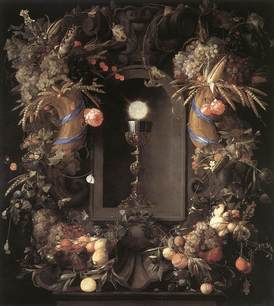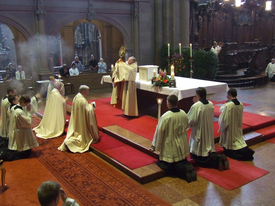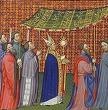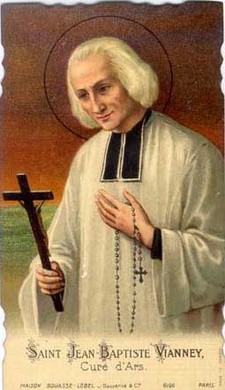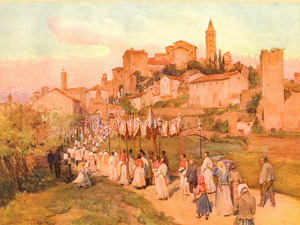 Of the glorious Body telling,
Of the glorious Body telling,
O my tongue, its mystery sing,
and the Blood, all price excelling,
which the Gentiles’ Lord and King,
in a noble womb once dwelling,
shed for this world’s ransoming.
Given for us, for us descending
of a Virgin to proceed,
man with man in converse blending,
scattered He the gospel seed,
till His sojourn drew to ending,
which He closed in wondrous deed.
At the last great Supper lying,
circled by His brethren’s band,
meekly with the Law complying,
first He finished its command,
then, immortal Food supplying,
gave Himself with His own hand.
Word-made-flesh, by word He maketh
very bread, His Flesh to be;
man in wine Christ’s Blood partaketh,
and if senses fail to see,
faith alone the true heart waketh
to behold the mystery.
Therefore we, before Him bending,
this great Sacrament revere;
types and shadows have their ending,
for the newer Rite is here;
faith, our outward sense befriending,
makes the inward vision clear.
Glory let us give and blessing
to the Father and the Son;
honor, might, and praise addressing,
while eternal ages run,
ever too His love confession,
who from Both with Both is One.
Amen.
Category: Eucharist
Blessed Imelda Lambertini
 Lord Jesus Christ, you received into heaven Blessed Imelda who loved you in the eucharistic banquet. By her prayers may we learn to approach your holy table with that same fervent love and so fulfill our longing to be with you, who live and reign with the Holy Spirit, one God, for ever and ever.
Lord Jesus Christ, you received into heaven Blessed Imelda who loved you in the eucharistic banquet. By her prayers may we learn to approach your holy table with that same fervent love and so fulfill our longing to be with you, who live and reign with the Holy Spirit, one God, for ever and ever.
The Eucharist is the actualization of God’s Kingdom today
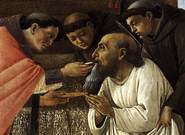 The way of peace leads to the altar and into the
The way of peace leads to the altar and into the
mystery of the Eucharist, the actualization of the Kingdom here and now. From
the altar, the light of the Resurrection penetrates into all that, in our
lives, remains shadowy and locked. With the Virgin of the Annunciation, we have
only to believe in Love and, believing, say faith’s simple “Yes.” Our “little
strength” is of no consequence. Let us go in to the Eucharist to be
overshadowed by the power of Love. Love will do the rest for “God is love” (1
Jn 4:16 ) and ” no word shall be impossible with God” (Lk 1:37). (MDMK)
Eucharistic identity: Christ present
As a sacrament, the Eucharist has a double aspect: it is
both a sign and the reality signified by it, both a remembering of the past and
a making-really-present: “When the Church celebrates the Eucharist, she
commemorates Christ’s Passover, and it is made present: the sacrifice Christ offered once for all on the Cross remains ever present” (Catechism
of the Catholic Church,1364).
Here the three meanings of “present” come together: Christ
in the Eucharist is 1) present, not absent, but really here; 2) present, not
past, but happening now; and 3) presented as a gift (a “present”), really
given; offered, not withheld. Christ is “present in many ways to his
Church” (CCC, 1373) but “[t]he mode of Christ’s presence under the Eucharistic species [forms, appearances] is unique. It raises the Eucharist above all the sacraments as ‘the perfection of the spiritual life and the end to which all the sacraments tend’ [St. Thomas Aquinas]. In the most blessed sacrament of the Eucharist ‘the body and blood, together with the soul and divinity, of our Lord Jesus Christ and, therefore, the whole Christ is truly, really, and substantially contained.’ ‘…[I]t is presence in the fullest sense…Christ, God and man, makes himself wholly and entirely present'” (CCC 1374). (from Peter J. Kreeft, Catholic Christianity, 2001)
Lauda Sion
The Church has been given the gift of the enduring Presence of the Lord in the Eucharist. Last week celebrated Trinity Sunday and today Corpus Christi. This feast dates to when Pope Urban IV (1261-64) inaugurated the Feast of Corpus Christi and asked Saint Thomas Aquinas (1225-74) to compose the the Liturgy for the Church. A striking feature of today’s Liturgy is singing of a poetic called a sequence, one of four done in the current liturgical life of the Church, though historically there were poetics for all the major feast of the Lord and others for saints. Today’s marvelous sequence Lauda Sion,is sung prior to the proclamation of the Gospel. As all sacred texts do, Lauda Sion expresses Catholic faith in the Body and Blood of Christ. The three verses of Lauda Sion are given here but you may pray the entire text by visiting here.
Words a nature’s course derange,
that in Flesh the bread may change
and the wine in Christ’s own Blood.
Does it pass thy comprehending?
Faith, the law of light transcending,
leaps to things not understood.
Hail! Bread of the Angels, broken,
for us pilgrims food, and token
of the promise by Christ spoken,
children’s meat, to dogs denied!
Shown in Isaac’s dedication,
in the Manna’s preparation,
in the Paschal immolation,
in old types pre-signified.
Jesus, Shepherd mild and meek,
shield the poor, support the weak;
help all who Thy pardon sue,
placing all their trust in You:
fill them with Your healing grace!
Source of all we have or know,
feed and lead us here below.
grant that with Your Saints above,
sitting at the feast of love
we may see You face to face.
Amen. Alleluia.
Wisdom and knowledge unfold in the Sacred Heart of Jesus
The great feast of the Sacred Heart of Jesus and with that the opening of the Year of the Priest (June 19), ought to be a time for us to focus on our study and prayer on the mercy and medicine offered to us by the Lord. Why is this feast an apt time for us to focus our energies on the theology of the Sacred Heart? Because as the psalmist says, seek His face; it is a true school of the Lord’s love. I believe, as you might, that the feast of the Sacred Heart is a propitious time to come to understand the wisdom and knowledge of the Divine Heart.
Receiving the Eucharist in sin
For some reason–and we can all make our own list as to
why–many Catholics have gotten away from the sacrament of Confession. I know my
own sense of grace and sin sends off an alarm when I receive Holy Communion
with mortal sin on my soul. My conscience gets the best of me as I think of
Saint Paul’s warning that receiving the Eucharistic Lord with sin on the soul: to do so is at one’s own peril. Avoiding Confession is imprudent, that is, not good at
all because one ignores reality, a life with sin squeezes out grace, one ignores the fact of Jesus’ love for me
personally and mercifully and our humanity is reduced. Some theologians and commentators will say that the Eucharist
is forbidden Food if one receives the Eucharistic Lord with mortal sin on the
soul. Saint John-Mary Vianney had strong thoughts about the subject:
“How many have the temerity to approach the holy table
with sins hidden and disguised in confession. How many have not that sorrow
which the good God wants from them, and preserve a secret willingness to fall
back into sin, and do not put forth all their exertions to amend. How many do
not avoid the occasions of sin when they can, or preserve enmity in their
hearts even at the holy table. If you have ever been in these dispositions in
approaching Holy Communion, you have committed a sacrilege. It attacks the
Person of Jesus Christ Himself instead of scorning only His Commandments, like
other mortal sins.” Vianney would also say that receiving Holy Eucharist
with sin on the soul “crucifies Jesus Christ in his heart.”
Those of us who claim to have a conscience would not be
pleased to hear from Saints Paul and John Vianney that by receiving Communion unworthily have
worked out our condemnation. Saint John-Mary Vianney was not a saccharine man, was he?
